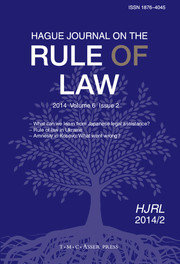Article contents
Constitutional Jurisprudence and the Rule of Law: Revisiting the Courts in Yusin Korea (1972-1980)
Published online by Cambridge University Press: 10 October 2013
Abstract
Since Korea's democratization in the late 1980s there has been powerful momentum to reexamine the past authoritarian rule. This article aims to contribute to the growing literature in the rule of law in authoritarian regimes by discussing the judiciary of Korea during the so-called Yusin era (1972-1980). The courts in the 1970s have been placed at the center of controversy in the wake of transitional justice, as a number of judicial decisions were reopened and original verdicts overturned. Most notable were the cases involving the so-called Emergency Decrees which served as a major instrument for the regime to suppress political opposition. In December 2010 and March 2013, the Supreme Court of Korea and the Constitutional Court of Korea each ruled that the Emergency Decrees were unconstitutional and that the courts in the 1970s were wrong in declining to exercise their judicial review power. The evolving jurisprudence through the authoritarian and subsequently democratic periods has significant implications for the rule of law in modern Korea. Constitutional jurisprudence in the post-democratization years in particular brings to the fore the thorny issue of negotiating between mounting democratic aspirations and the exigency of legal stability.
- Type
- Articles
- Information
- Copyright
- Copyright © T.M.C. Asser Press and the Authors 2013
- 3
- Cited by




